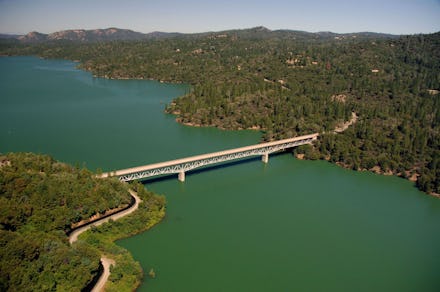One GIF That Should Terrify Everyone Living in California

The news: The stunning images above shows the effects of California's drought on Lake Oroville State Recreation Area, a state park north of Sacramento.
The photographs were taken three years apart: the green and hydrated version in 2011 and its parched sister in 2014. The lake has frequently been cited as a prime example of the drought's destruction: "Currently at 32% of its total 3,537,577 acre feet," the caption reads.
Yes, things are that dire. The sky-is-falling headlines about the drought — "Cemeteries Eradicate Grass to Curb Water Crisis," "California Drought Threatens Nation's Most Productive Farming Valley" and "Californians Stealing From Hydrants Amid Drought" — are no joke. The drought really is that bad.
A study recently published in the journal Science reported that the western United States has lost over 63 trillion gallons of water, or roughly four inches of water spread across the region. According to the U.S. Drought Monitor, about half of California is mired in an "exceptional drought," and the rest of the state is almost as bad.
The water supply is also at risk. Because the drought has depleted lakes, rivers and snowpacks, authorities have begun to tap into groundwater — which, like fossil fuel, is largely irreplaceable — to provide water to people. As National Geographic argues, "We're pumping irreplaceable groundwater to counter the drought. When it's gone, the real crisis begins."
So what's being done? California Gov. Jerry Brown signed a $687 million relief package into law in March, which will provide money for "storm water recapturing, expanded use of recycled water, better management of groundwater storage and stronger water conservation measures," Reuters reported.
On national level, there are currently two dueling bills, one from the Senate and another from the House of Representatives, to aid in drought relief. They're currently stalled, however, and the two sides have yet to come to an agreement or a joint bill.
This hand-wringing may sound like a broken record, but there's a reason for that: It's still an enormous problem. And until something real gets done, you'll keep hearing the same points.